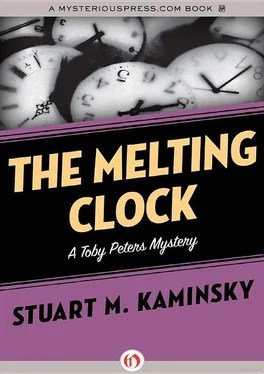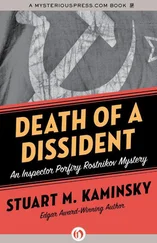Stuart Kaminsky - Melting Clock
Здесь есть возможность читать онлайн «Stuart Kaminsky - Melting Clock» весь текст электронной книги совершенно бесплатно (целиком полную версию без сокращений). В некоторых случаях можно слушать аудио, скачать через торрент в формате fb2 и присутствует краткое содержание. Жанр: Криминальный детектив, на английском языке. Описание произведения, (предисловие) а так же отзывы посетителей доступны на портале библиотеки ЛибКат.
- Название:Melting Clock
- Автор:
- Жанр:
- Год:неизвестен
- ISBN:нет данных
- Рейтинг книги:4 / 5. Голосов: 1
-
Избранное:Добавить в избранное
- Отзывы:
-
Ваша оценка:
- 80
- 1
- 2
- 3
- 4
- 5
Melting Clock: краткое содержание, описание и аннотация
Предлагаем к чтению аннотацию, описание, краткое содержание или предисловие (зависит от того, что написал сам автор книги «Melting Clock»). Если вы не нашли необходимую информацию о книге — напишите в комментариях, мы постараемся отыскать её.
Melting Clock — читать онлайн бесплатно полную книгу (весь текст) целиком
Ниже представлен текст книги, разбитый по страницам. Система сохранения места последней прочитанной страницы, позволяет с удобством читать онлайн бесплатно книгу «Melting Clock», без необходимости каждый раз заново искать на чём Вы остановились. Поставьте закладку, и сможете в любой момент перейти на страницу, на которой закончили чтение.
Интервал:
Закладка:
“I don’t know. Strong. Hard to look away from. Sad, maybe.”
“Dali’s paintings are not sad,” came a woman’s accented voice, the voice I had heard an hour earlier on the phone. “Dali’s paintings are a celebration of the inner voice. He doesn’t not paint what other people see. He paints what no one sees.”
“I’ll go with that,” I said, looking at her.
She was small and clearly the boss wherever she went. She moved past Zeman into the middle of the room and looked around at the paintings.
“That,” she said, pointing at the largest one above a white sofa, “is me.”
She was right. It was Gala Dali painted like an angel with wings, floating in the air about as high as a basketball net while below a quartet of men, one with a cockeyed grin, looked up under her dress. She was dressed in black-the real Gala, not the one in the painting. I figured her for thirty-five, her face pale and not quite pretty but clear, her dark hair brushed back. She was a woman who took the world seriously, which was probably quite a problem, since not many people in the world were prepared to take her husband seriously.
“Dali will be down in a minute,” she said. “He just awakened from his dreams and is dressing. Please sit.”
I sat in a wooden chair painted black.
“I’ll be out working on the Hup if you need me,” Zeman said to both Gala and me. Though it was his house, the information didn’t seem to be of much interest to her. She looked at me with dark, dark eyes, trying to see something that would tell if I was worthy of an audience with the great man.
Zeman went back outside and Gala was alone with me, her hands clasped together in front of her like a concerned Mexican chaperone.
“The clocks,” she said. “I want the clocks returned, but Dali’s paintings are more important.”
“What do they look like? The clocks and the paintings?”
“Only Dali can truly describe his own work,” she said with pride. “The clocks are for the table, the size of two heads high and numbers in gold. They are deep, dark red-stained birch wood from the Ural mountains and on the bottom of each clock is an inscription in Russian. How did you break your nose?”
“It says, ‘How did you break your nose’ in Russian?”
“You are trying to be witty,” she said dryly.
“My brother broke my nose, twice,” I said.
“He wanted to break your nose?”
“The second time, probably. First time was an accident. He was a violent kid. He’s a violent man.”
“Brothers are serpents of the mind.” The voice came from the stairway on my left.
I looked up. Dali stood at the top of the stairs dressed in a clown’s outfit, a big floppy red suit with puffy white buttons, oversized slap-shoes. He wore no makeup. He didn’t need any. I watched him come down the stairs and enter.
It wasn’t a bad entrance as entrances go, but I’ve lived in and around Hollywood for almost half a century and I’d served security stints when I was with Warner Brothers and on my own. My favorite was the night Thelma Todd walked into a Victor McLaglin party, took off her white mink coat, and revealed one hell of a beautiful nude body. She looked down as if her having nothing on was a complete surprise. I was at the door, backing up the butler to keep out crashers. I saw Thelma Todd from behind. Dali in a clown suit didn’t come close.
Dali came in, looked at his wife-who nodded-and examined me, touching his nose from time to time as if he were considering how to put me into one of his paintings. I didn’t like the idea.
“Brothers are vampires,” he said. “Brothers are vampires and fathers are ghouls. Mothers are saints whom we mistreat. You agree?”
He stopped circling and waited for my answer. Gala seemed to draw in her breath. Somewhere outside and not too far away a noisy lawn mower was being pushed.
“No,” I said.
“You need money?” he asked, pointing his chin at me. “You want to work?”
“It’s either that or learn to barter,” I said. “And I’ve got nothing to trade with.”
“I like you, Peters,” he said with an accent that couldn’t decide whether it was French or Spanish. “You have the face of a peasant.”
“Thank you,” I said.
“But I have liked Fascists and Surrealists,” he whispered, leaning toward me so the Fascists and Surrealists would not hear him. “The Fascists wear brown shirts that look like the merde and the Surrealists paint with the merde. They have much in common.”
“Then I withdraw my thanks.”
“You think Dali is mad?” he asked, now moving to the matching white chair across from me and trying to sit in it with back-erect dignity, which is hard to do when you’re wearing an oversized red suit and size 30 shoes. Gala moved forward to stand behind him and put her hands on both his shoulders. He reached up with both hands and touched hers. It looked like genuine affection, but I wasn’t the one to recognize genuine affection.
“I don’t know,” I answered.
“The difference between me-” he pointed to himself in a grand gesture-“and a madman is that I am not mad.”
He had said that before. I knew it, but instead of pointing it out I took a chance and said, “Are we going to keep it up like this or is there some place on the program when we have an intermission and you tell me what I’m doing here?”
“He is rude, Dali,” Gala said, lifting her chin imperiously.
Dali patted her hands to reassure her.
“Dali is rude,” he said. “He is honest. Would you like something to drink, Toby Peters?”
“Pepsi if you’ve got it. RC will do. Water with ice, if it comes to that.”
Gala left the room. I thought she was going for my drink. She never came back with it.
When she was gone, Dali turned to me.
“Three things I wish to tell you,” he said, holding up his right hand in a closed fist. “First”-and one finger came up-“I love American radio but your announcers, actors speak too fast. Second”-second finger-“I must have my paintings back, and Gala’s clocks.”
His left hand went into the pocket of his clown suit and came out with an oddly shaped piece of wood. He played with the wood while we kept talking.
“What were they paintings of and how big are they?” I asked.
“One was the size of that one,” he said, pointing at a painting about the size of the front of a refrigerator. “Another was the size of that wall.”
“Big picture,” I said.
“Magnificent picture,” he agreed. “Months to paint.”
“Third picture,” I said.
His face went slack, the bug-eyed Huntz Hall look disappeared. The mask dropped and he looked human, frightened.
“It is like this,” he said, standing and holding his arms out to show me that the missing painting was about a yard across and a yard and a half high.
“They’ll be hard to find if I don’t’ know what they look like,” I prodded.
“They are unmistakably Dali’s,” he said, a touch of the normal still there. “And that is the problem.”
“I’m not an art critic or an artist,” I said.
“And I am not a detective,” he said.
I spent the next half hour asking him questions while he fidgeted with the piece of wood and paced around the room. The paintings and the clocks had been taken from his house in Carmel about a month ago. It had happened during the night when he and his wife were asleep. All of the paintings had been framed; they had been taken frame and all.
“What can they do with these paintings?”
“Probably nothing while Dali lives,” he said. “Nothing but show them to or sell them to people who will appreciate them. When Dali dies, they will be worth much and these … these insects can claim Dali sold the paintings to them or gave them.”
Читать дальшеИнтервал:
Закладка:
Похожие книги на «Melting Clock»
Представляем Вашему вниманию похожие книги на «Melting Clock» списком для выбора. Мы отобрали схожую по названию и смыслу литературу в надежде предоставить читателям больше вариантов отыскать новые, интересные, ещё непрочитанные произведения.
Обсуждение, отзывы о книге «Melting Clock» и просто собственные мнения читателей. Оставьте ваши комментарии, напишите, что Вы думаете о произведении, его смысле или главных героях. Укажите что конкретно понравилось, а что нет, и почему Вы так считаете.












